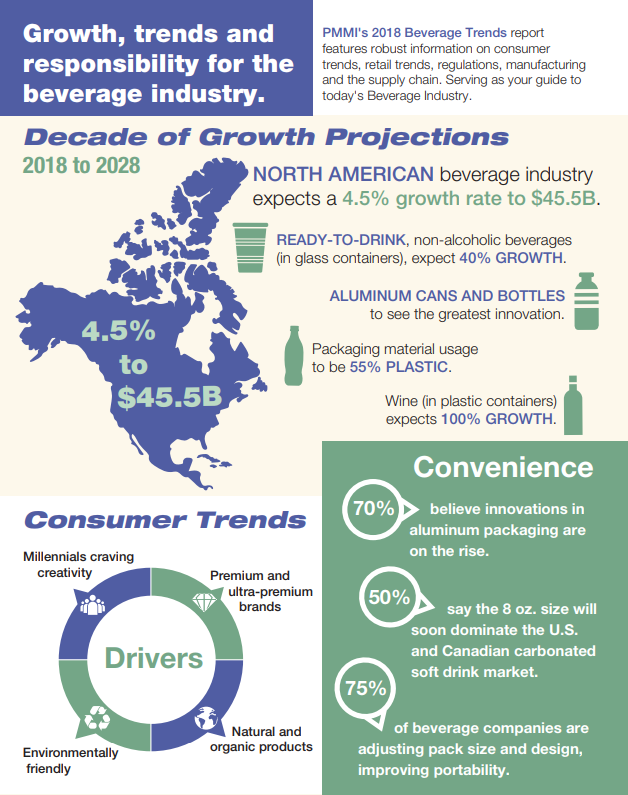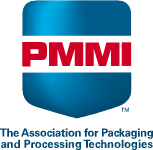-
Trade Shows
-
Media Group
-
Business Intelligence
- Benchmarking Reports The most comprehensive, timely and accurate source of market information available to members.
- Economic Reports Useful data to help you make informed business decisions.
- Industry Reports Quantifiable outlook of specific market or trend as it pertains to the packaging and processing industry.
- International Research Download the latest reports to help you navigate overseas markets.
- Infographics An at-a-glance view of the key findings of many PMMI reports.
- Quickie Surveys View all Business Intelligence quickie surveys.
- Video Webinars View all Business Intelligence video webinars.
- PMMI Media Group Custom Research Custom Research Studies to Advance Your Business
-
Workforce
-
Global Marketing
- ExportEXPERTS Program Receive export & market advice from industry peers.
- Webinars & Export Events Get access to speakers and topics to help you succeed in global markets.
- Find Sales Agents/Distributors Search agents by country and PACK EXPO trade shows.
- Government Resources Explore all the Federal, State and Non-profit resources available to exporters.
- International Research Download the latest reports to help you navigate overseas markets.
- Pavilions at International Trade Shows View a list a calendar of trade shows where PMMI will sponsor pavilions.
-
Industry Services
- MaX Member Forum The solution developer for key member business issues identified by PMMI programs.
- Young Professionals Network A network dedicated to advancing the industry through its next generation of leaders.
- OpX Leadership Network Operations and technical leaders present the best approach for TCO, FAT, OEE, Workforce and other critical areas.
- Packaging Management Council Packaging leaders discuss package development and distribution.
- Packaging & Processing Women's Leadership Network Serves to recruit, retain and advance women's careers in the industry through networking and leadership development.
- PMMI Association Services PMMI provides management services to packaging and processing industry associations.
- Standards
-
Events
- Annual Meeting Learn the latest industry trends and network with industry professionals during this three-day event.
- Executive Leadership Conference An annual three-day learning and networking event infused with fun.
- PMMI Roadshow Regional events that bring together PMMI members and CPG professionals at member facilities across the country.
- Young Professionals Conference A one-day educational and networking event for entry to mid-level young professionals.
- Packaging Recycling Summit Join the editors of Packaging World and your peers across the packaging value chain for a 3-day executive summit.
- PACKEvolution Latinoamérica Explore the key technologies and trends that are reshaping the future of packaging in Latin America.
-
My PMMI
- NAM Cyber Insurance for PMMI Members
- PMMI ProSource Directory Online directory of packaging and processing technology suppliers in North America.
- PMMI ProSource FAQ
- My Account Access your account information.
- Pay Orders Pay your company orders.
- PMMI Member App Download the app and stay up-to-date with all things PMMI like never before!
- PMMI Advantage View / download the PMMI Advantage Presentation.
- Annual Highlights Information about PMMI’s activities and accomplishments throughout the preceding year
- Video Highlights Video series highlighting PMMI member benefits.
- PMMI 365 See how PMMI’s member-exclusive programs keep you connected to customers all year long through member offerings.
- Resources
- Join
Beverage Industry Growth and Innovation Highlighted in PMMI Report and Infographic
Beverage Industry Growth and Innovation Highlighted in PMMI Report and Infographic
Follow PMMI on Twitter:
@PMMIOrg
FOR IMMEDIATE RELEASE
The beverage packaging and processing industry is experiencing major growth according to the 2018 Beverage Trends in Packaging and Processing report and accompanying infographic, produced by PMMI, The Association for Packaging and Processing Technologies. PACK EXPO International and the co-located Healthcare Packaging EXPO (Oct. 14–17, McCormick Place, Chicago) arrives just in time to feature all the solutions beverage manufacturers need to navigate this rapid development.
The North American beverage industry is expected to grow 4.5 percent to $45.5 billion in the next ten years. Despite 70 percent of respondents believing aluminum cans and bottles are expected to see the greatest innovation in design, container and graphics enhancements, plastic still accounts for 45 percent of packaging material usage. Ready-to-drink, non-alcoholic beverages (in glass containers) are expected to grow at about 40 percent and wine (in plastic containers) is projected to increase 100 percent by 2028.
According to the findings of the report, major consumer trends like convenience and portability are causing a shift in beverage manufacturing. More than 50 percent of participants at carbonated soft drink companies believe the eight-ounce size will soon become the predominant size across the United States and Canada. Of the 75 percent of beverage companies who talked about pack sizes over 75 percent shared that their companies are also adjusting both pack sizes and pack designs to improve portability.
Major drivers of these consumer trends include a desire for premium and ultra-premium brands, natural and organic products, environmentally friendly packaging, as well as Millennials craving creativity.
There are also several retail trends that beverage manufacturers should consider:
- Refrigerated section in grocery stores experiences the most rapid innovation
- Mixed flavor, multi-packs are on the rise
- Large format club stores, Walmart and Whole Foods accelerate innovation at all major beverage companies
Environmental responsibility has increased in importance to beverage manufacturers. PET bottles from 100 percent recycled PET resin now offer the same clarity and barrier properties as 100 percent virgin PET. More than 75 percent of beverage companies are actively taking steps to reduce the materials in their package and lessen their overall carbon footprint. Aluminum accounts for 70 percent of recycled beverage containers while glass accounts for 23 percent.
For an in-depth look into the current landscape of beverage packaging and processing operations, download PMMI’s 2018 Beverage Trends in Packaging and Processing report.
This fall’s PACK EXPO International and co-located Healthcare Packaging EXPO, produced by PMMI, offers ample opportunities for beverage manufacturers to explore new package designs, cutting-edge machinery technology and automation solutions to meet consumer demands and help achieve their business goals. Bringing together 2,500 exhibitors and 50,000 attendees over 1.2 million net square feet of exhibit space from virtually every vertical market, PACK EXPO International is indisputably the year’s most comprehensive packaging event on the continent—and the one that powers innovation like no other. With so many solutions on display, attendees are sure to find ways to apply new technology, achieve cost-saving efficiencies or unexpectedly boost output.
For more information and to register, visit www.packexpointernational.com.
















